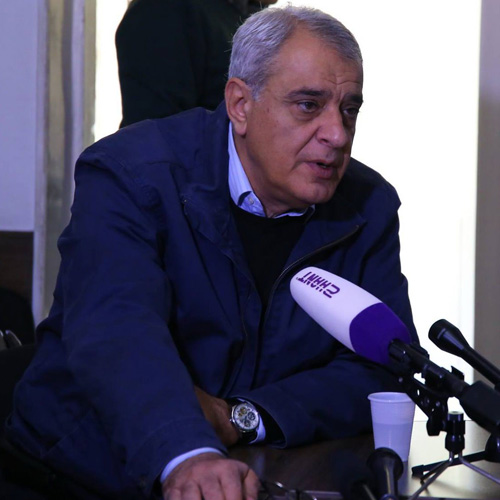“Aravot” interviewee is the Special Representative of the President of Armenia from 1992 to 1995, David Shahnazaryan
– Mr. Shahnazaryan, you were the Special Representative of the President of Armenia from 1992 to 1995, the main negotiator for Nagorno-Karabakh issue both in OSCE Minsk Group and other formats. The announcements on the resolution of Nagorno-Karabakh issue by the new Government of the Republic of Armenia did not find a widespread acceptance. The former Minister of Defence of the Republic of Armenia, the First and the Second Presidents of the Republic of Armenia voiced their evaluation. What opinion do you have overall?
– I will not comment on the announcements you mentioned, inasmuch as inner political intention was present in the mentioned three announcements. As regards the assessments by the new Government, then – yes, various responses have been in place by both a set of international experts, and Azerbaijan, but nothing irreversible has taken place, and secondly, the Minister of Foreign Affairs, Zohrab Mnatsakanyan’s announcements in the National Assembly were realistic.
– Nevertheless, it was expected that the negotiation process should become active, but the Government changed in Armenia, a row of announcements were made relative to the negotiation process. In response to them different announcements are voiced by Azerbaijan. I would like you to give more details, because you are one of the best experts of Nagorno-Karabakh issue and the negotiation process, well aware of the whole process and you have meetings with the Co-Chairs of the OSCE Minsk Group, are in a permanent communication with Vladimir Kazimirov. Mr Shahnazaryan, how dangerous is this situation to the Armenian side? How should Armenia behave in this situation?
– Nagorno-Karabakh issue comprises manifold components each of them having various layers in its turn. Your questions, as well as the discussions among the society refer to maximum of two components – the negotiation process and military security. Your previous question also referred to the upper layer of the negotiation process of Nagorno-Karabakh issue alone.
– Which are those components?
– It is not all the components which can be publicized, especially the layers of those components. The comprehensive concept of Nagorno-Karabakh issue should be based on those components, strategic and tactical objectives and issues should be stipulated in all components in the general concept, as well as it is necessary to work harmoniously and interconnected. Taking into consideration the signals and statements from mediator countries and Baku, also Azerbaijan’s initiation of high activeness in external politics, it is noticeable that all of them are in a quite rush. It is a fact that the geopolitical and regional processes have certain influence on the issue of Nagorno-Karabakh, which is more than natural. It is possible some “surprises” are served to Armenia in the upcoming negotiations. Taking into account the new opportunities, Armenia should conduct an initiative policy first of all in the negotiation process, for which serious preconditions have come forth, inasmuch as a new government is formed in the Republic of Armenia, deep and new realities are in place. It is necessary to act so as the negotiation process is not, so to say, in the field of Azerbaijan with the agenda and rules produced by Baku, but on Armenia’s side. However, let me mention that there is not much time, we should act very fast. Armenia’s international ranks have increased. These have added a supplemental component to Nagorno-Karabakh issue and Armenia is able and obliged to take an initiative in the negotiation process. Saying negotiation process, I do not mean only the format of the OSCE Minsk Group. It is a very important, but only a layer of the negotiation component nonetheless.
– Although you said that you cannot publicly mention about all components, I should ask about one component or layer. What does Azerbaijan’s activeness on Nakhijevan side mean? Is the engineering done only for propagation purposes or preparations for the implementations of aggressive intentions are made?
– Azerbaijan pursues a policy of a gradual increase of tension on Armenia-Nakhijevan border. In that way it pursues the objective of bringing forth another negotiation format in parallel to the OSCE Minsk Group with Turkey’s participation. I will refrain from giving further details publicly. By the way, let me add that a sharp and uncompromising fight is going on for core positions among the authorities in Azerbaijan.
– You mentioned about the new opportunities opened in front of Armenia, the necessity of initiative policy. And what difficulties Armenia can face up within the external politics?
– Of course, the most important and the most difficult field is Nagorno-Karabakh conflict. I am sure no serious difficulties will emerge in the political directions with Georgia, Iran, the EU, US and others. However, I have some concerns over Armenia-Russia relations. The relations with Russia are extremely important to Armenia. Moscow plays the most important role in Nagorno-Karabakh issue. Armenia-Russia relations have never been simple, and Russia does not mean only Kremlin, manifold state and non-state institutions are in place which have an influence on Kremlin. Russia wants to see an understandable and predictable government in Armenia. Let me add, all people in Armenia are interested in the success and productivity of the new Government, I am sure, including presently the sole opposition – the Republican Party of Armenia.
EMMA GABRIELYAN
“Aravot”
30.05.2018



















































